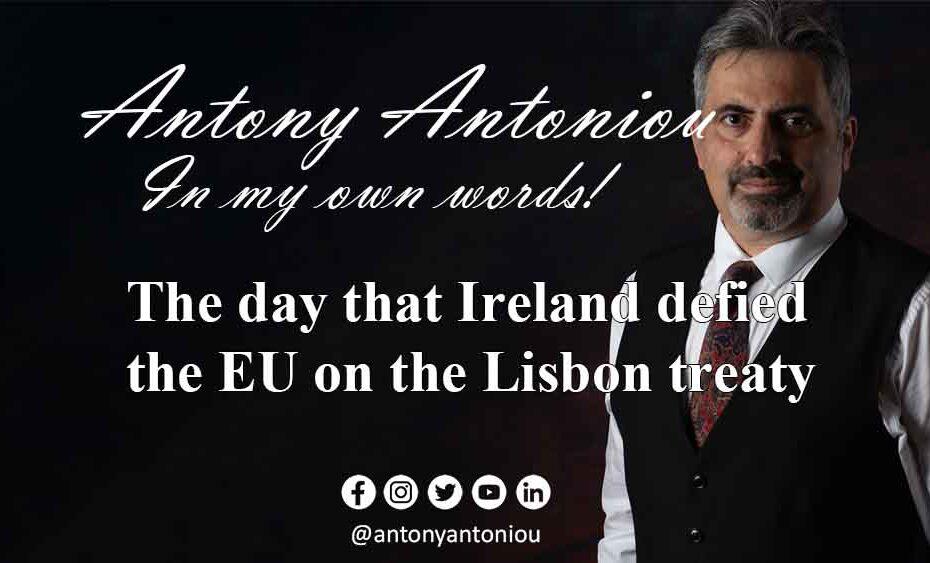The day that Ireland defied the EU on the Lisbon treaty
“Ireland’s ‘No’ to the EU: A Triumph of Democracy or Elitism?”
Introduction
In a world where democracy is cherished as the cornerstone of society, it’s disheartening to witness a scenario where the resounding voice of the people is met with skepticism and disdain. This is precisely what unfolded in Ireland when, on the 12th of June 2008, 53.4% of Irish voters rejected the Lisbon Treaty, setting the stage for a political maelstrom. In this article, I explore the implications of the EU’s decision to push for a second referendum and the consequent uproar, revealing a stark contrast between democratic values and elitism.
A Hypothetical Scenario
Imagine, for a moment, if the Republican party in the United States, following Barack Obama’s election in that same year, by 52.9% of American voters, insisted on a second election because they garnered just 45.7% of the votes. In this hypothetical situation, they might label Obama’s victory as a “triumph of ignorance” and call for another election to “get it right.” The outrage and indignation that would ensue are easy to predict.
Ireland’s “No” and the EU
Now, consider Ireland. In a similar vein, Ireland’s 53.4% rejection of the Lisbon Treaty was treated as the “wrong” answer, as if the Irish had failed a simple math exam. This mindset is a grave misjudgment of democracy, one that goes to the core of the European Union’s philosophy. A majority of Irish people said “no,” making it the legitimate, sovereign, and final answer. “No” truly means “no.”
The Irish Experience
The Irish were subjected to a barrage of derogatory comments when they voted against the Lisbon Treaty. Some referred to them as “ungrateful bastards” because Ireland had received financial support from the EU. Others blamed “populist demagogues” for manipulating the Irish vote and insisted that the EU’s plans should not be “derailed by lies and disinformation.”
There were claims that the Irish did not comprehend the treaty due to its “technocratic, near incomprehensible language.” This line of thinking insinuates ignorance on the part of the Irish people, a sentiment that is not only misplaced but also offensive.
A History of Rejection
This was not the first time European nations had rejected EU initiatives. In 2005, both France and the Netherlands voted against the European Constitution, an agreement that bears similarities to the Lisbon Treaty. Yet, instead of understanding and respecting the democratic will of the people, these rejections were met with contemptuous comments and accusations of ignorance.
The EU’s Response
The EU’s attempts to force through the constitution and later the Lisbon Treaty, despite their democratic rejection, paint a picture of a corrupt, outdated oligarchy, seemingly detached from the people they are meant to represent. The Irish people, like many others in Europe, are passionate about the idea of a united Europe. Their rejection was not a rejection of Europe itself but of a document produced by an aloof European elite who seem to mistrust the continent’s citizens.
Conclusion
The Irish “No” vote to the Lisbon Treaty is a striking example of the tension between democratic values and elitism within the EU. It’s a reminder that democracy should be more than just a buzzword; it should be the bedrock upon which political decisions are made. As we watch this ongoing saga, we can only hope that the EU recognizes the importance of respecting the voices of its member states and their people, rather than seeking to impose its will from on high.
In the wake of the Irish rejection of the Lisbon Treaty and the subsequent demand for a second referendum, it’s evident that a significant clash exists between democratic principles and EU elitism. The situation raises crucial questions about the EU’s commitment to respecting the voices of its member states and their citizens:
– The EU’s decision to push for a second Irish referendum underscores a disregard for the democratic process and the will of the people.
– The perception that “No” votes were a mistake or a result of misunderstanding is fundamentally flawed, undermining the principles of democracy.
– Historical examples of similar rejections, such as the French and Dutch votes against the European Constitution, reveal a consistent pattern of contemptuous responses from EU officials.
– The EU’s insistence on imposing its will despite democratic rejections fosters the perception of an archaic oligarchy disconnected from the concerns and values of its citizens.
– The Irish people’s rejection of the Lisbon Treaty does not signify a rejection of Europe but rather a document produced by a distant European elite.
In summary, the Irish “No” vote highlights a pressing need for the EU to reevaluate its approach, placing a higher value on respecting democratic processes and the sovereignty of its member states.
It is quite interesting how the media has shifted positions over the years, The Guardian made this very point back in 2008, before the days when it decided to scaremonger the entire nation about the catastrophic consequences to the UK, should it leave this infernal, autocratic failed experiment.

